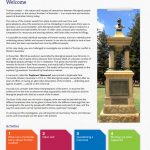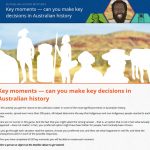Case Study Overview
Students investigate an incident of frontier conflict in Western Australia and are challenged to consider different interpretations of the event. They carry out an inquiry, calling witnesses and critically analysing the evidence presented. They also investigate a memorial, called the ‘Explorers Memorial’, which carries both the original inscription from 1913 and a later interpretation of events by Aboriginal peoples from 1994. In doing so they experience how history ‘hears’ and ‘silences’ voices and how people use the past in the present.
Format
This unit of study is presented as a website which includes a video, on-line activities including Key moments — can you make key decisions in Australian history game, and worksheets (in Word Doc format). The unit is compatible with computers and iPads.
Case Study unit of work inquiry structure (pdf)
- Activity 1: What can a memorial tell us about frontier conflict?
- Activity 2: Video visit
- Activity 3: Questioning a memorial
- Activity 4: Working out what happened
- Activity 5: Four representations of the event
- Activity 6: Reflection – should old memorials be replaced?
About the Interactive
A recently updated interactive entitled, Key moments — can you make key decisions in Australian history, is also available for this case study.
Key Moments — can you make key decisions in Australian history?
In this activity you get the chance to be a decision-maker in some of the most significant events in Australian history. These events, spread over more than 200 years, helped determine the way that Indigenous and non-Indigenous Australians reacted to each other. Make your decisions about what you think should have happened – and then compare that with the historical reality.


